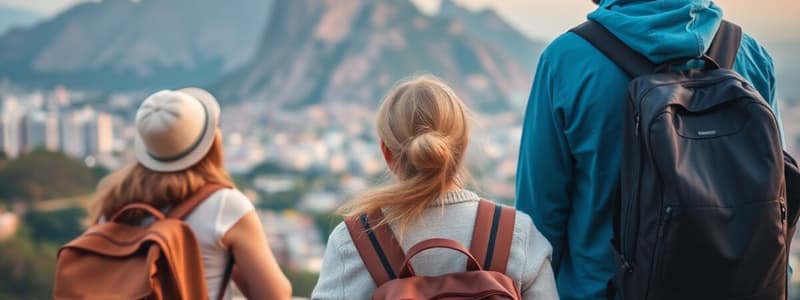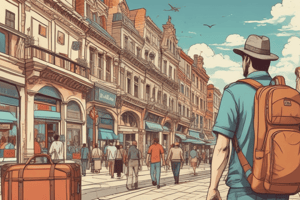Podcast
Questions and Answers
How would you classify a traveler who consistently seeks out destinations that are unfamiliar and offer novel experiences, demonstrating a high tolerance for uncertainty?
How would you classify a traveler who consistently seeks out destinations that are unfamiliar and offer novel experiences, demonstrating a high tolerance for uncertainty?
- Mid-Centric
- Allocentric (correct)
- Vulnerable
- Psychocentric
Which of the following scenarios best exemplifies incentive travel?
Which of the following scenarios best exemplifies incentive travel?
- A couple visiting historical sites in Europe.
- A solo traveler backpacking through Southeast Asia.
- A group of employees awarded an all-expenses-paid trip to Hawaii for exceeding sales targets. (correct)
- A family taking a vacation to Disney World.
What distinguishes cultural tourism from other forms of leisure travel?
What distinguishes cultural tourism from other forms of leisure travel?
- Its avoidance of outdoor activities.
- Its emphasis on relaxation and comfort.
- Its preference for luxurious accommodations.
- Its focus on engaging with a destination's history, traditions, and culture. (correct)
A travel agency is designing a tour package that focuses on activities such as hiking, climbing, and skiing in the Swiss Alps. Which type of tourism is being marketed?
A travel agency is designing a tour package that focuses on activities such as hiking, climbing, and skiing in the Swiss Alps. Which type of tourism is being marketed?
How does adventure tourism differentiate itself from general nature-based tourism?
How does adventure tourism differentiate itself from general nature-based tourism?
Which action MOST exemplifies a tour guide adapting the tour's style to match the interests of the group?
Which action MOST exemplifies a tour guide adapting the tour's style to match the interests of the group?
What is the MOST CRITICAL skill a tour guide needs to effectively manage unforeseen tour disruptions?
What is the MOST CRITICAL skill a tour guide needs to effectively manage unforeseen tour disruptions?
A tour guide notices a member of their group is struggling to keep up on a walking tour. What is the MOST appropriate course of action?
A tour guide notices a member of their group is struggling to keep up on a walking tour. What is the MOST appropriate course of action?
What is the PRIMARY ethical consideration a tour guide must address when sharing stories about historical events?
What is the PRIMARY ethical consideration a tour guide must address when sharing stories about historical events?
Which of the following scenarios BEST demonstrates a traveler embodying the principles of socially responsible travel?
Which of the following scenarios BEST demonstrates a traveler embodying the principles of socially responsible travel?
You are at a local restaurant with a group of travelers. Which action BEST demonstrates respect for local customs and traditions related to dining?
You are at a local restaurant with a group of travelers. Which action BEST demonstrates respect for local customs and traditions related to dining?
While leading a tour, you notice a fellow tour operator is sharing inaccurate historical information that could perpetuate harmful stereotypes. What is the MOST ETHICAL course of action?
While leading a tour, you notice a fellow tour operator is sharing inaccurate historical information that could perpetuate harmful stereotypes. What is the MOST ETHICAL course of action?
How can tour guides effectively cater to the diverse tastes, behaviors, and values of international travelers?
How can tour guides effectively cater to the diverse tastes, behaviors, and values of international travelers?
In what way can tour guides meet the demands of well-traveled tourists who are more discriminating and demanding about the level of service and care they receive?
In what way can tour guides meet the demands of well-traveled tourists who are more discriminating and demanding about the level of service and care they receive?
What strategy would a tour guide employ to cater to travelers who want to see more in less time, while also accommodating those who prefer in-depth, slower-paced excursions?
What strategy would a tour guide employ to cater to travelers who want to see more in less time, while also accommodating those who prefer in-depth, slower-paced excursions?
What is the most effective way for tour guides to capitalize on the increasing interest in unusual and less-visited destinations?
What is the most effective way for tour guides to capitalize on the increasing interest in unusual and less-visited destinations?
How should guides prepare for the future demand of specializing in a wide variety of areas such as nature, architecture, foreign and sign languages?
How should guides prepare for the future demand of specializing in a wide variety of areas such as nature, architecture, foreign and sign languages?
What is the primary requirement for tour guides when working with international travelers, considering potential difficulties in understanding customs, body language, and personalities?
What is the primary requirement for tour guides when working with international travelers, considering potential difficulties in understanding customs, body language, and personalities?
In Thailand, what specific actions and legal ages should international travelers be aware of to ensure they respect the local laws and customs?
In Thailand, what specific actions and legal ages should international travelers be aware of to ensure they respect the local laws and customs?
What is the most effective approach for a tour guide to address potential challenges arising from group travel, where individual travelers have unique needs and preferences?
What is the most effective approach for a tour guide to address potential challenges arising from group travel, where individual travelers have unique needs and preferences?
Flashcards
Psychocentric Traveler
Psychocentric Traveler
A traveler who prefers safe and familiar destinations.
Allocentric Traveler
Allocentric Traveler
A traveler who seeks new and diverse experiences.
Leisure Travelers
Leisure Travelers
Individuals who travel for personal enjoyment, relaxation, or recreation.
Incentive Travelers
Incentive Travelers
Signup and view all the flashcards
Adventure Tourism
Adventure Tourism
Signup and view all the flashcards
Sports Tourism
Sports Tourism
Signup and view all the flashcards
Challenges of Group Travel
Challenges of Group Travel
Signup and view all the flashcards
Cultural Understanding for Guides
Cultural Understanding for Guides
Signup and view all the flashcards
Demand for Broader Perspective
Demand for Broader Perspective
Signup and view all the flashcards
Changing Traveler Expectations
Changing Traveler Expectations
Signup and view all the flashcards
Specialization of Guides
Specialization of Guides
Signup and view all the flashcards
International Traveler Etiquette
International Traveler Etiquette
Signup and view all the flashcards
Legal Considerations in Travel
Legal Considerations in Travel
Signup and view all the flashcards
Starting a Meal Etiquette
Starting a Meal Etiquette
Signup and view all the flashcards
Role of a Tour Guide
Role of a Tour Guide
Signup and view all the flashcards
Tour Guide Responsibilities
Tour Guide Responsibilities
Signup and view all the flashcards
Knowledge Requirement for Guides
Knowledge Requirement for Guides
Signup and view all the flashcards
Socially Responsible Traveler
Socially Responsible Traveler
Signup and view all the flashcards
Reducing Waste
Reducing Waste
Signup and view all the flashcards
Leave No Trace Principle
Leave No Trace Principle
Signup and view all the flashcards
Study Notes
Traveler Classification
- Travelers are categorized by personality, purpose, baseline characteristics, and travel type.
- Personality:
- Psychocentric: Prefer safe destinations.
- Allocentric: Seek new experiences.
- Mid-centric: Prefer a balance.
- Travel Purpose:
- Business: Travel for work.
- Pleasure: Travel for leisure (family vacations, resort trips, solo travel).
- Medical: Travel for medical reasons.
- Baseline Characteristics:
- Vulnerable: Have medical conditions or other vulnerabilities.
- Long-term: Travel for an extended period.
- Travel Types:
- Explorers: Engage with the destination environment and adapt behavior.
- Group Travelers: Involve groups of people often organized by tour companies.
- Resort Travelers: Focus on rest and rejuvenation in a beautiful location.
- Adventure Tourists: Involve physical dexterity in contact with nature, activities often carried out outdoors.
- Business Tourists: Motivated by work or professional reasons, destination is irrelevant.
- Leisure Travelers: Travel for personal reasons such as relaxation, entertainment, sightseeing, or visiting family/friends.
- Incentive Travelers: Receive all-expenses-paid trips for achieving goals or milestones.
- Cultural Travelers: Learn about a place's History, Traditions, and Culture.
- Expedition Members: Part of a group going on organized journeys/trips with a specific purpose.
- Mountain Tourists: Outdoor activities in mountainous areas (walking, climbing, winter sports).
- Rural Tourists: Participate in the rural lifestyle, usually via nature-based activities or cultural experiences, like history, heritage etc
- Sports Tourists: Travel to participate in or watch sporting events.
- Additional notes: Each category has a specific description, and example images might be included. Singapore has strict anti-chewing, spitting, and smoking in public laws. Respectful behavior, understanding cultural customs, and communication skills are key international travel considerations
Tour Guide Responsibilities
- Provide Information: Details about history, purpose, and architecture of a site.
- Tell Stories: Share people and events from a site.
- Manage Itineraries: Ensure the tour follows the plan.
- Ensure Safety: Keep the group safe and together.
- Respond to Emergencies: Offer assistance during incidents.
- Comply with Regulations: Ensure adherence to establishment rules.
- Adapt to Needs: Adjust the pace, content, and style for the group.
- Solve Problems: Find creative solutions to issues.
Tour Guide Skills
- Knowledge: Extensive knowledge of local history, attractions, archaeological sites.
- Adaptability: Flexible to adjust plans quickly.
- Problem-Solving: Ability to think on their feet and find solutions.
- Time Management: Balance covering all planned stops with flexibility for detours.
Socially Responsible Traveler
- Plan: Research destination, look for sustainable options (accommodations, tour operators, transportation).
- Support Local Businesses: Purchase local items/souvenirs, hire local guides.
- Respect Local Culture: Learn about customs and traditions.
- Reduce Waste: Avoid single-use plastics, bring reusable items (bags, bottles, utensils).
- Conserve Resources: Take shorter showers, turn off lights/AC, reuse towels.
- Reduce Carbon Footprint: Walk, cycle, use public transport.
- Leave No Trace: Pick up trash, stay on trails, respect wildlife.
- Educate Yourself: Learn about environmental/social issues in the destination.
- Volunteer: Help the local community.
Roles of a Tour Guide
- Leader, Educator, Public Relations, Host, and Conduit.
- Leaders navigate, control, entertain.
- Educators offer historical, cultural, geographic knowledge.
- Public Relations representatives represent countries, businesses.
- Hosts make travelers comfortable.
- Conduits emphasize visitor experience over their own.
Synthesis and Application of Roles
- Guiding is an individual, creative role.
- Guides need style, personality, and teachable skills.
- Roles vary based on the tour.
- The five roles presented describe the roles expected by visitors/industry.
- Image and identity of the guide are important.
Studying That Suits You
Use AI to generate personalized quizzes and flashcards to suit your learning preferences.




